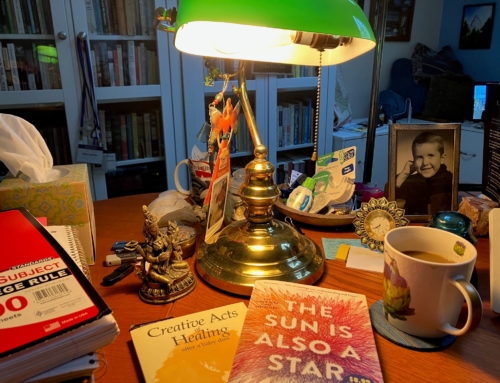Finished Bird by Bird. Why did I not read this classic 20 years ago when it first came out?
Anne Lamott is wise, kind, humble, fierce, hilarious. She wields the sword of truth and sometimes roasts marshmallow on it. Everyone who writes or wants to write should read this book.
Bird by Bird addresses both the benefits and the risks of truth-telling. This was of great interest to me, because I have been burned a few times by the risks. I loved this story: Lamott’s father once published a scorchingly honest essay about the community where he and his family lived. Not only did the family not get run out of town, not only did her father survive the storm of disapproval the piece sparked, but he actually received genuine thanks from some of the people he’d so unflinchingly described.
Close attention can be a gift. Lamott talks about how the stories she told about her grade school classmates made them feel larger than life. I know that’s how I and my sibs felt when my father told stories about us at the dinner table, making guests or relatives laugh. With the spotlight suddenly on us, we realized that–oh wow!–we were noteworthy, significant. Or at least cute. I know that often when I write it’s an attempt to express reverence for the friend or the everyday object in front of me. It’s a way of showing I don’t take what I’m looking at for granted. It’s a way of trying to capture and share what I see.
But what about telling stories that are less than complimentary? I once wrote a story about my grandmother’s death that made my father furious. (Luckily it got published before he saw it, or I probably would have burned it and buried the ashes.) In retrospect, I admit that my approach to creating the story left something to be desired. It was furtive. Critical. Passive-aggressive. I recorded descriptions and snippets of dialog without letting people know what I was doing—it felt a bit like stealing. I wrote down all the things my dad and grandfather did that outraged me without ever confronting them directly. I think in some ways I set myself up for the painful experience I had when my father finally saw the piece.
But I was telling the truth as I saw it.
Lesson: It’s best to work openly, and with love. But if you want to be a truth-teller, you have to be brave, and you have to have conviction, because you never know how people will respond to what you say. Still, says Lamott, if you’re a writer, it’s not your business to sweep the truth under a rug.
She encourages people to write about wrongs they’ve suffered, to write stories with villains. Go ahead, she says, even if the “villains” are still living and happen to be your benign elderly parents whom you no longer want to demolish—may now even enjoy. Be sure to change your villains’ names and personal characteristics, she says, but don’t change your account of harm caused, havoc wreaked. Don’t change the story about the event that caused the damage. She doesn’t say it, but I infer: no damage, no drama. And no healing.
None of us are evil, but all of us commit regrettable acts, and in my opinion, that is why there are stories.[1] Stories are all about how to confront and deal with evil. Lamott contends that a writer’s job is to steer into the heart of emotion, and I think that means you have to write into the heart of what’s wrong, and imagine a way to truly right it.
So an aspiration this book leaves me with is to try to dig deeper with my pen, to scrape away the fear and politeness and apathy that are plastered over my raw wounds like dead leaves over a sewer drain, and to really look at what’s there. But not just to look and accuse. I want to look with loving intent at my life’s various train wrecks, ready to see my own role in the chaos. I want to never forget that I am my own best villain. I want to imagine redemption for everyone involved.
Lamott says, see your writing as a gift. Not just to those you’re writing about, but also to other writers whose work has helped and inspired and entertained you. This imaginary audience will draw the best possible work out of you, because of course you want to give those authors something worthwhile in return.
In addition to writing for my friends and family, I’ve been thinking about which authors I’d like to write a present for. First to mind: Lorrie Moore, Rick Moody, Louise Penny, Craig Johnson, Milan Kundera, Doris Lessing, Yogananda, Jesus—and obviously, Anne Lamott.

